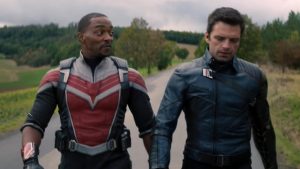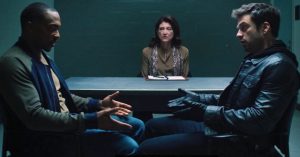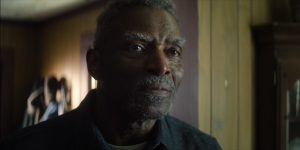SPOILERS FOR THE BAD BATCH AHEAD!
I feel like I ought to apologize for how inconsistent and unreliable I’ve been when it comes to reviewing The Bad Batch. I’ve enjoyed almost the entire first season – there was a long stretch in the middle where it was slagging a bit, but to be honest the show has been very well-written, blessed with truly stunning animation and great voice-acting, and filled to the brim with the kind of obscure Star Wars lore that I love. And yet I’ve reviewed only a handful of episodes out of sixteen, in no particular order, and with barely any rhyme or reason. I am genuinely sorry about that, and I hope that the recently-announced second season of The Bad Batch will allow me a chance to make it up to my readers properly, with weekly reviews.

No promises, though. The biggest difficulty about reviewing any Star Wars animated show – be it The Bad Batch, The Clone Wars, or even sometimes Rebels – is when you get into the adventure-of-the-week episodes that are all…fine. Not great, not bad, just fine. And as much as I loved Rhea Perlman’s sassy crime-lord Cid, a lot of the episodes that involved the Bad Batch going on missions for her tended to lean towards being fine.
But as is so often the case with Star Wars animated series’, The Bad Batch gradually started planting seeds for big plot twists and major character choices down the line as it moved into the back-half of its first season. The two-part finale, which started with last week’s episode and concluded today, builds off those little things sprinkled throughout the season to give us something emotionally satisfying, epic, and consequential…and surprisingly dark and intense, as a bonus. Nobody even died in today’s episode, but that didn’t stop me from feeling terrified on behalf of all of my favorite characters.
Before we jump into the action, just a quick refresher on what’s going on since I didn’t actually review last week’s episode (again, sorry about that). The rain-battered ocean planet of Kamino, once home to the galaxy’s great clone armies, has been abandoned by the last of its cloning personnel, its conniving prime-minister has been executed by the Empire, and an Imperial fleet led by the vicious Admiral Rampart (voiced by Noshir Dalal) is currently unleashing hellfire on the planet’s cloning facilities from the stormy skies. Only the members of the Bad Batch are still stuck on the planet’s swiftly-disintegrating surface, scrambling to find a way back to their starship before everything is submerged in the abyss.
That was a great note on which to end last week’s episode and open today’s – wiping such an iconic Star Wars location off the map entirely, and simply because the Empire has no further plans for the clones but still can’t afford to have cloning technology fall into the hands of other buyers, is cruel, callous, and heartbreaking. Thanks to The Clone Wars‘ frequent use of the setting, we’ve grown attached to Kamino over the years, and we can all feel the clones’ pain at seeing the closest thing most of them have ever had to a home thoroughly destroyed. A brilliant touch is having a clone trooper deliver the news of Kamino’s destruction to Rampart, and hearing his voice crack slightly.
Meanwhile, down in the cloning facilities, that overwhelming pain – mingled with the fear of being crushed to death by the encroaching ocean – leads to some raw confessions from the members of the Bad Batch, who have to work alongside their treacherous former teammate, Crosshair (voiced, like most clones, by Dee Bradley Baker), to survive. Crosshair’s claim that he removed his inhibitor chip long ago but still willingly chose to side with the Empire despite the atrocities he’s witnessed them commit (and which he’s now engaged in himself), is horrifying to the Bad Batch, but it helped me finally realize why the Empire would deem human stormtroopers preferable to clones.

Because humans can be brainwashed, and unlike with clones, that brainwashing isn’t achieved via a piece of technology implanted in one’s head. Real brainwashing, the kind of brainwashing that is very much still utilized by fascists and far-right ideologies in the modern day to obtain an aggressive, twisted form of loyalty, can’t be surgically removed like an inhibitor chip, and the effects don’t just wear off on their own. Real brainwashing changes a person from the inside out, and unlearning it requires active participation from that person. That last part is crucial.
And it’s what Omega (voiced by Michelle Ang) realizes, during several powerful encounters and conversations with Crosshair throughout this episode. Omega’s driving motivation throughout the show has been her own fierce and seemingly unconditional loyalty, so it might be strange to some viewers that she doesn’t try to force Crosshair to return to the Bad Batch at the end of the finale, or even force Hunter and the team to go back for him. But that’s what makes Omega’s loyalty so inspiring – because at the end of the day, she realizes that ultimately Crosshair has to take the first step. His issue isn’t an inhibitor chip that they can physically remove from his head; it’s something he needs to work on. She can’t do that for him.
And when Crosshair’s ready, if he still wants to rejoin the Bad Batch, Omega will be waiting for him. I think that’s a pretty awesome message to send. Most importantly, it doesn’t put the onus on Omega to fix Crosshair or save his soul. There was a lot of discourse about this topic in Raya And The Last Dragon, where the solution to a similar problem seemed to be that if you just keep putting your unconditional faith in a person who has repeatedly and unapologetically hurt you, they’ll eventually change. That’s…untrue, and while I enjoyed that movie, I much prefer The Bad Batch‘s approach to this particular topic. That’s why Crosshair and the Bad Batch splitting up will (hopefully) be healthy for both of them in season two.
The strong focus on Omega and Crosshair in this episode does mean that everybody else gets a little sidelined, with the possible exception of the Kaminoan medical service droid AZI-3 (voiced by Ben Diskin). This isn’t the first time AZI-3 has been integral to the story – in The Clone Wars, he and the clone trooper Fives came within a hair’s breadth of foiling the Empire’s plan with the inhibitor chips – but here he proves that he’s downright heroic, sacrificing himself to save Omega from drowning. Crosshair is able to save both Omega and the droid’s body, but it remains to be seen if AZI-3 will get powered up again in season two.
He’s the only character who “dies” in the finale, but as I mentioned, there’s still a lot of suspense. The episode leans heavily into elements and tropes of the survival genre, and at points feels very evocative of the Subnautica video games – which also involve swimming around alien oceans, evading fearsome sea-monsters and exploring subterranean ruins. As someone with a severe fear of the darkest depths of the ocean, I’m (naturally) obsessed with that premise, and seeing it brought to life in today’s episode of The Bad Batch was unexpected, but thrilling. And, yes, a little terrifying. I was glad when they arrived at the surface to discover clear skies on Kamino for the first time ever, but weirdly that and the black smoke still rising from the sea also felt very Subnautica to me.

Luckily, Kamino’s wealth of cloning knowledge will live on through the scientist Nala Se (Gwendoline Yeo), Omega’s mother figure, whom we see being transported on an Imperial shuttle to a forested planet at the end of the episode. If/when we rejoin her in season two, I wouldn’t be surprised if her top-secret cloning work with the Empire is directly linked to the events of The Mandalorian. Remember that Dr. Pershing, who was messing about with Grogu’s midi-chlorians in The Mandalorian, was himself a Kaminoan scientist – which means he had to have been one of the medical personnel evacuated from the planet along with Nala Se, which means we might see him in animated form next year when The Bad Batch returns for season two. Keep an eye out!
Episode Rating: 8.5/10









